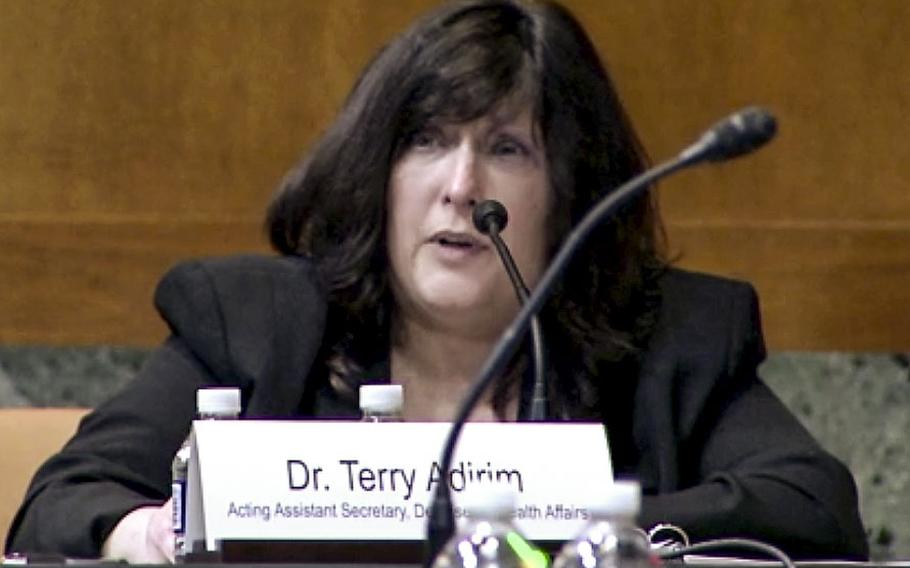
In a screen capture from a Senate video, Dr. Terry Adirim, acting assistant secretary of defense for health affairs, testifies at a Senate Appropriations defense subcommittee hearing on April 20, 2021. (U.S. Senate)
Stars and Stripes is making stories on the coronavirus pandemic available free of charge. See more staff and wire stories here. Sign up for our daily coronavirus newsletter here. Please support our journalism with a subscription.
WASHINGTON — The Defense Department’s health program is facing a massive funding shortfall due to the coronavirus pandemic, the top defense health official said Tuesday.
For the 2021 fiscal year, the Defense Health Program has $673 million in pandemic-related costs, and that is projected to grow to more than $1.8 billion, Dr. Terry Adirim, acting assistant secretary of defense for health affairs, told the Senate Appropriations defense subcommittee.
The Defense Health Program is among several Defense Department health-related appropriations accounts. For fiscal year 2021, the program had a budget of $33.2 billion, with $9.2 billion for in-house care and $15.8 billion for private sector care. The program also has funds for research, education and training.
The military health system includes 50 hospitals and hundreds of clinics serving 9.6 million Tricare beneficiaries, according to its website.
The Coronavirus Aid, Relief and Economic Security (CARES) Act provided $2.2 billion in supplemental funding for fiscal year 2020 to the system for its initial response to the pandemic, according to Adirim.
Of the $1.8 billion in projected pandemic costs for FY21, about $1 billion is related to private sector costs, which are higher than expected, she said. The unexpected costs are mainly from additional laboratory testing, personal protective equipment and other requirements, including public health surveillance and cleaning of medical facilities, according to Adirim’s written testimony.
Adirim was adamant that the funding shortfall would not affect care for service members and other beneficiaries.
However, these projected costs could impact the health system for years. Sen. Jon Tester, D-Mont., chairman of the appropriations defense subcommittee, asked Adirim whether Congress needed to “step up” to help. She said that the system was not planning to ask for supplemental funding, but instead was looking at taking funding from within the Defense Health Program, such as sustainment and modernization and facilities maintenance, to make up for the shortfall. The program might go to the Defense Department for funds as well.
“We are currently now looking at how we can mitigate the shortfalls in any way that we can. It’s a challenge,” she said.
Tester also asked the military surgeons general representing the Army, Air Force and Navy at the hearing whether they were concerned about the shortfall’s impact on readiness. They each said they were not concerned now but would continue to assess the funding shortfall and its effect on medical readiness through the rest of the fiscal year, which ends in September.
Kenney.Caitlin@stripes.com Twitter: @caitlinmkenney